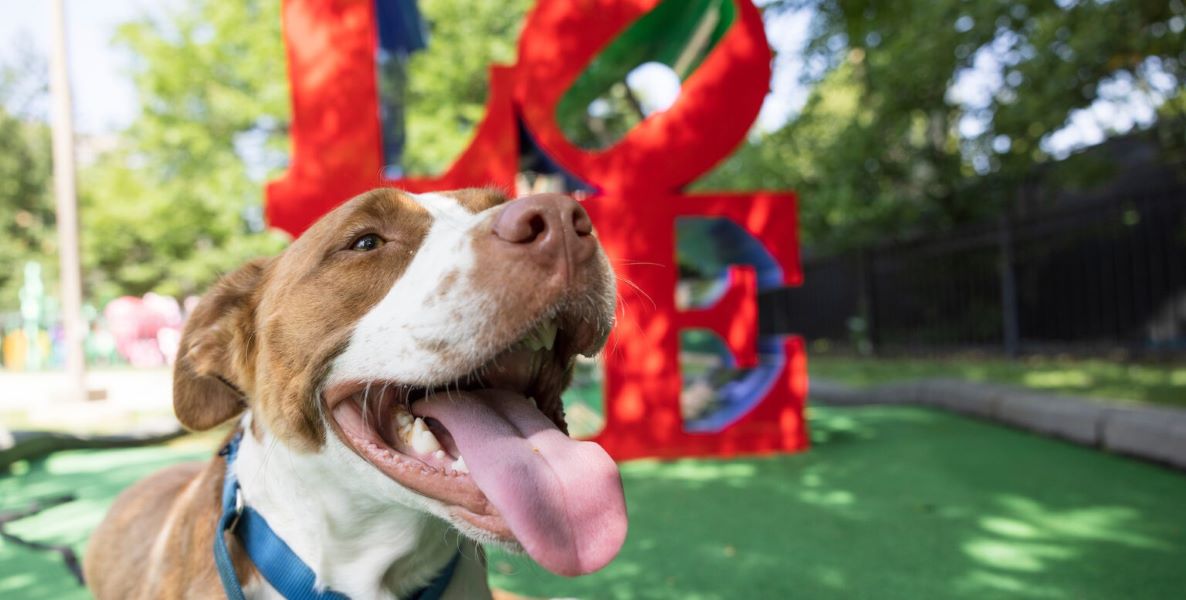Sarah Barnett, acting co-executive director of the Animal Care and Control Team of Philadelphia (ACCT Philly), describes a memorable Monday at Philadelphia’s only open intake shelter. Amidst the regular flow of the work day, ACCT was finally able to place a group of three dogs — one blind, two hearing impaired, and all three have to stay together — in a home. Still, Barnett did not want to jinx it. As the past months had shown, ACCT never knows what kind of animals are going to leave, or more likely, return to, them.
ACCT has been grappling with the same hardships this year as so many other animal shelters across the city and nation. Shelters, as Barnett jokingly but truthfully acknowledges, were probably one of the only businesses to benefit from the pandemic. Everyone wanted a pet — and it seemed like everyone who wanted one, got one. But since the end of the pet pandemic boom, the seasonal ups and downs that shelters usually have (like an influx of unwanted bunnies after every Easter) have been replaced by constant unpredictably high intake numbers.
According to data from Shelter Animals Count, animal surrenders in the first quarter of 2022 were up 8 percent for cats and 9.7 percent for dogs nationwide, when compared with the same period last year. Unfortunately, this translates to more pets being time-stamped — which means giving an animal a specific amount of days to be adopted before the animal is euthanized. Barnett says these decisions are not made lightly.
And, there’s good news for Philly: While national averages for euthanasia are up 9 percent, ACCT’s current population of 87 dogs and 150 cats is high, but manageable. Nonetheless, Barnett describes ACCT as “ground zero’ for helping animals. ACCT is obligated to accept all unwanted or stray animals. No matter if they’re cats, dogs, chickens, lizards, potbelly pigs, snakes, or horses, space must be made.
Right now, ACCT and other shelters can use all the help they can get to keep all pets safe across the city. From adopting to fostering, and volunteering to raising awareness, people of all ages and animal affinities can do their part to take care of Philadelphia’s pets.
Here are 10 basic ways to do so.
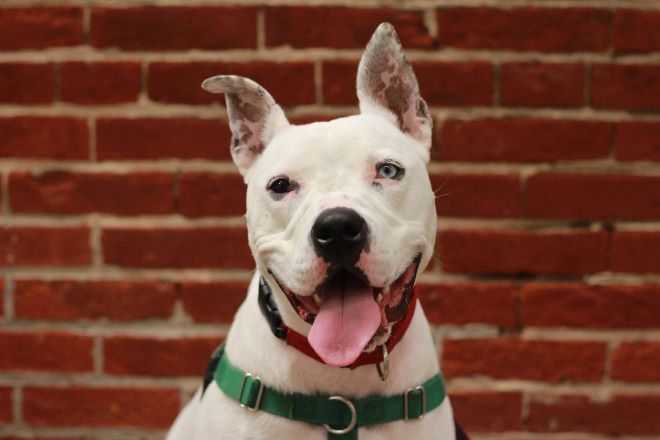
1. Adopt, don’t shop
Barnett reiterates the refrain of animal shelter workers and supporters: “Start choosing adoption.” Adopting from a shelter saves lives: When you adopt one animal, you make room in the shelter for another. (It’s also generally less expensive than buying a new family member from a breeder or pet store.)
Shelters across the city have different processes for animal adoption. Most suggest you begin by browsing their website for a pet that catches your eye, applying, and scheduling a visit. ACCT does not currently require an appointment to visit an animal and has laid out the step-by-step process needed to take an animal home with you. The Pennsylvania SPCA on Erie Avenue offers same-day adoptions — with the caveat that if you want to adopt a dog, you must bring the whole family.
At their four locations around Philadelphia, the Philadelphia Animal Welfare Society (PAWS) encourages you to meet your new best friend and to adopt some of their most urgently in need of a home animal first. To see the most up-to-date information about what pets are available, what you need to bring for a visit, and whether or not the shelter is requiring pre-approval for a visit, be sure to check out any shelter’s website.
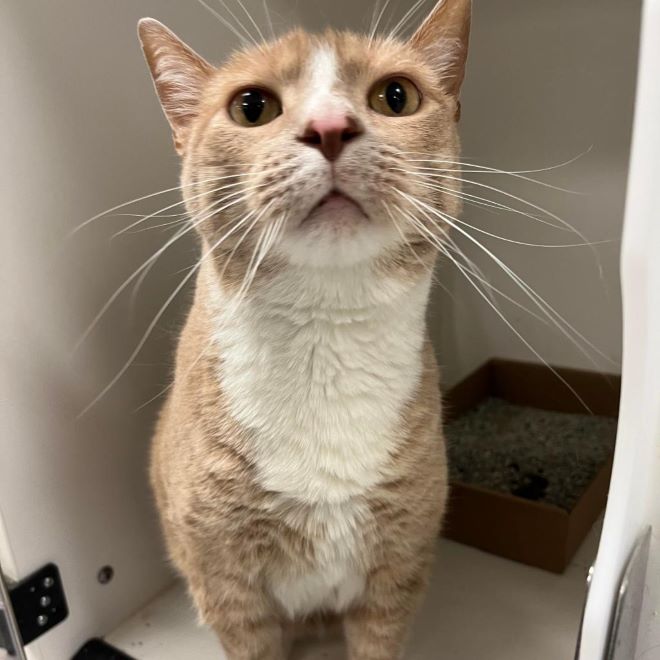
2. Foster
Fostering a pet can be a great way to have an extra temporary member of the family — or to give a pet a test run, if only to convince the one household holdout that having a pet makes everything better.
Shelters rely on good folks to house and care for animals who are recovering from surgery, or too sick or too young to be adopted at the moment. ACCT, PAWS, PSCPCA, and Morris Animal Refuge all provide fostering opportunities for pets of all needs and ages. All that is required of you is basic knowledge of animal care, and a safe and loving home.

3. Foster … a litter of adorable kittens
ACCT’s Itty Bitty Kitty Committee pairs newborn kittens without moms and in need of bottle-feeding every two hours with kind humans who can help them survive overnight. Requirements: A spare bathroom and a night when you don’t need a solid 8 hours, and a desire to save lives. Email foster@acctphilly.org or lifesaving@acctphilly.org. ACCT will drop off the necessary supplies and their days-old kittens.
The need is year-round, but greatest during the summer, when ACCT receives litters of kittens every single day.

4. Take good care of your own pets
Already have a fur baby or babies? Keep them safe and healthy:
Microchip: Get your pet microchipped (many shelter animals come microchipped), register the microchip properly, and double check its readability. This ensures a lost pet does not wind up in shelters. Without a properly registered microchip, shelters are unable to find lost pet’s owners. Each chip, says Barnett, functions as a “driver’s license.”
Identification tag: Make sure your animal always wears a collar with an updated identification tag. Your pet’s name, your address, and cell phone number are essential to ensure your pet can be found and returned safely to its home.
Lost them anyway? File a lost pet report by dialing ACCT at (267) 385-300, filing a report online, or posting to their Facebook page. Post recent photos of your friend online. Contacting all shelters across the city.
Indoors: Do not leave your animal unattended outdoors for any long period of time.
Vet visits: Routine veterinary care is vital to protecting your pet and the numerous homeless pets around the city. Can’t afford it? The PSCPA offers free and low-cost vaccinations and a wellness clinic for families in need.
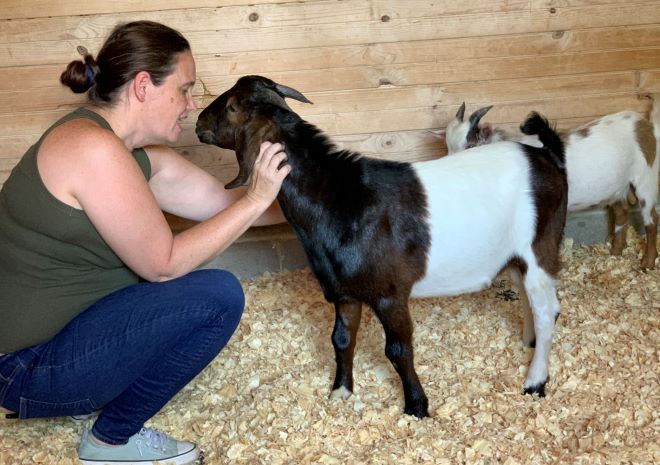
5. Spay and neuter
Getting your pet spayed or neutered not only decreases the likelihood of a female getting pregnant, but can also decrease the likelihood of them leaving home: Hormones can drive animals to run around the neighborhoods.
Spayed females tend to live longer. Neutered males avoid testicular cancer and other prostate problems.
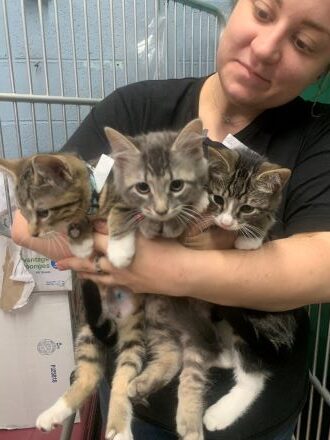
6. Trap, spay/neuter, return a feral cat
TNR (trapping, neutering, and returning) is the number one way to prevent the suffering of community (aka stray) cats. In 11 years, one female cat can have 4,700 offspring. (We’ll give you a moment to sit with that.)
Barnett knows that people may be hesitant to trap a cat and then return them to the outdoors. But she says if the animal is safe, it is more than okay to return the cat to where it happily lives. (On the other hand, if you believe this cat would be happier in your home, they’ll help you with that too.)
ACCT offers a guide to TNR, with instructional videos and a contact who’ll loan you a trap. They also have an endowment to pay for 800 procedures per year, and a mobile vet partnership with Penn Vet that moves around the city and can perform up to 25 surgeries per day.
When you trap outside cats and bring them in to get spayed or neutered, they also receive vaccinations (FVRCP and rabies), flea treatment, a wellness exam and food. Cats also have their left ear left “tipped,” to indicate they’ve been spayed/neutered and vaccinated.
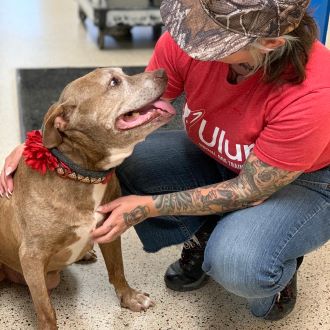
7. Volunteer in unexpected ways
For animal lovers who want to add a helping hand, volunteering is a fun, family-friendly – and vital – way to help out Philadelphia’s unhomed animals. Each shelter has unique opportunities:
ACCT welcomes volunteers as groups and individually. They are currently looking for:
-
-
- Photographers
- Transporters
- Event leaders
-
Street Tails Animal Rescue (STAR) in Northern Liberties requires its volunteers to have no history of committing abuse or violence, up-to-date tetanus vaccination, and a willingness to help however needed: walking dogs, completing office work, cleaning up … Although most volunteers must be 18 and up, STAR has a junior volunteering program for 16 and 17-year-olds. A junior volunteer commits to two hours each month.
PAWS’ four locations seek volunteers who can help care for dogs and cats, support the adoption process, and work events.
PSPCA volunteers build bonds with furry friends by playing with a cat, taking a dog outside, engaging with the community, and helping out where needed.
Local pet store chain Doggie Style Pets always has a dog or two in a window to adopt (they work with the Point Breeze-based Saved Me Adoption Center, which rescues animals from out-of-state kill shelters). Their adoptable dogs often need socializing and walks around the block. Each shop has volunteer applications onsite.
The other part to volunteering, is raising awareness — something that Barnett admits, most people don’t even consider to be volunteering. Posting about local pets, shelters, and reposting shelters advertisements for dogs in need can be a huge help. There is something for everyone to do. Just follow all of the organizations above, and repost away.
You can also go a step further and become an online sleuth to help owners find missing pets. Sign up for Nextdoor — an app that allows pet owners and friends to connect with shelters and discuss lost pets — to help your neighbors reunite with their pets.
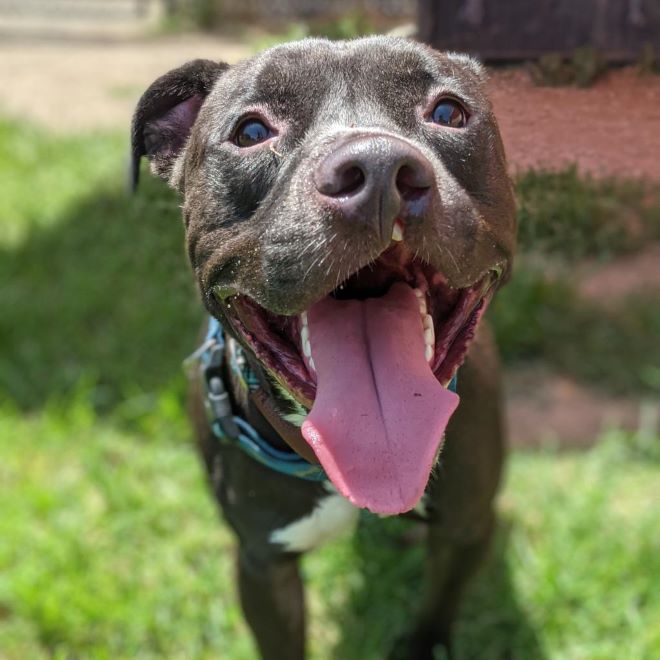
8. Donate goods to shelters
Shelters are always in need of harnesses, soap, trash bags, treats, bedding, and canned pumpkin. You can donate supplies or ship a box of newly purchased items directly to shelters.
Donations to PAWS, PSCPCA, ACCT, Street Tails allow shelter pets to thrive. Visit your local shelter’s website for more information about how you can contribute most effectively.
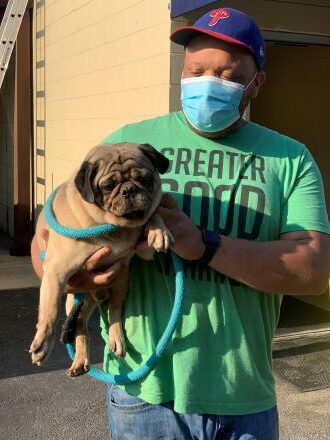
9. Help a pet owner keep their pet
If there were one thing that Barnett would hope to see change soon, it would be an economic upturn, and the restoration of the supply chain. Prosperity helps keep pets and people together. Financial insecurity often separates them. When you need to choose between feeding your human family or yourself and feeding your pet, well, that’s often not a choice at all.
ACCT’s Philly Pet Food Pantry helps keep pets and their people together by providing families with the food they need. To ensure our furry friends are well fed, and kept out of shelters, consider purchasing from ACCT’s Amazon Wishlist, or if clicking add to cart is not enough, sponsor a pantry day.
Remember Freerice? Downington-based PA Dog Rescue has a fun, online dog-based game of their own that donates kibble to hungry dogs for every correct question answered. Enjoy.
Low-cost veterinary clinics ensure that medical care is not a barrier to a happy home. Emancipet on Adams Avenue (in the Northeast) specializes in spay/neuter surgery and preventive care and is in need of donations To reduce future pet homelessness, Media-based Providence Animal Center provides comprehensive medical care that you can donate to or volunteer for.
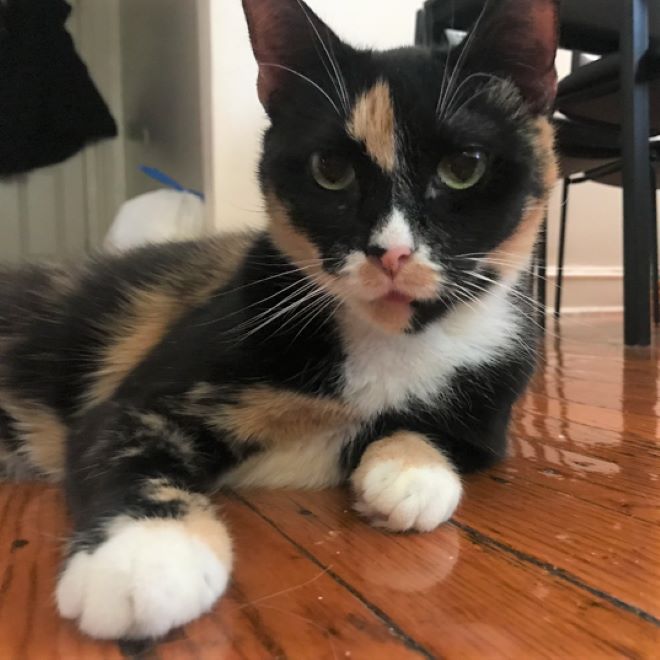
10. Donate cash
Without the proper funds, shelters and pet owners are unable to provide for their animals. Caring for animals is expensive. Organizations always appreciate in-kind donations, but they also say that they can stretch your dollar further than you. (They receive discounts on bulk supplies, etc.)
The smallest donations can make a huge difference.
![]() MORE WAYS TO HELP YOUR COMMUNITY FROM THE PHILADELPHIA CITIZEN
MORE WAYS TO HELP YOUR COMMUNITY FROM THE PHILADELPHIA CITIZEN
Finnigan at Love Park, Photo by Lisa Godfrey Photography via PAWS



